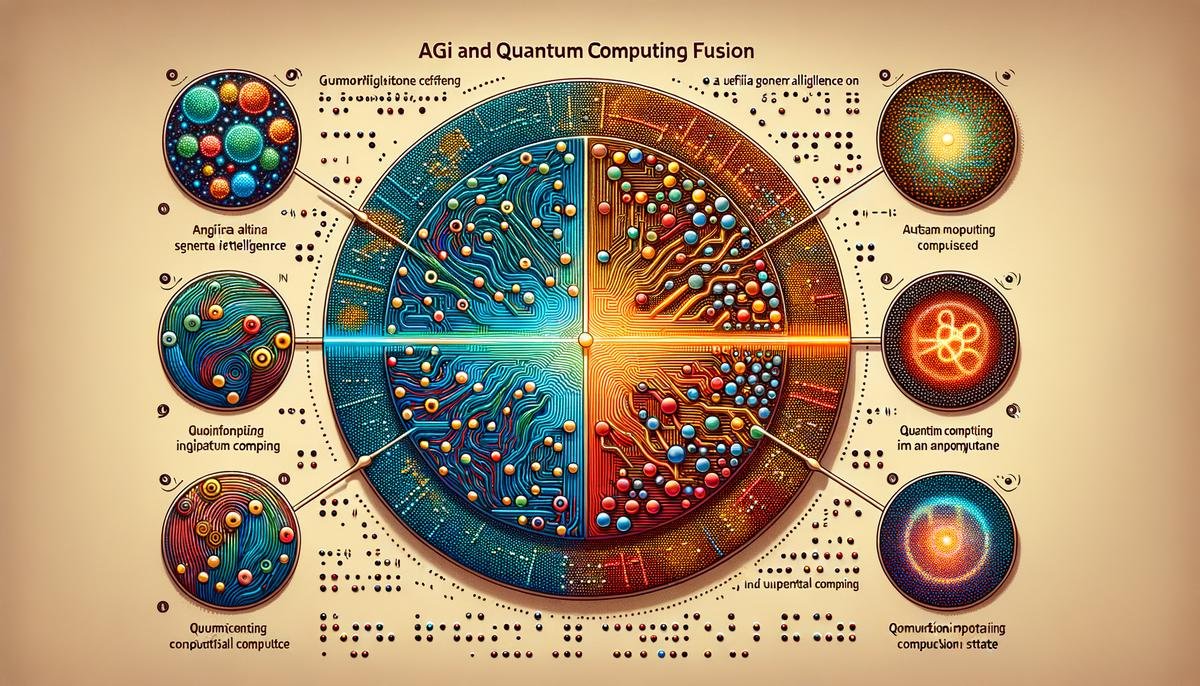Artificial General Intelligence (AGI) and quantum computing are pushing the limits of technology, guiding us towards a future where machines could work alongside us, solving the world’s most complex problems. This exploration into the fundamentals of AGI and quantum computing aims to unpack the revolutionary potential these technologies hold. By understanding the core principles that underpin these advancements, we can appreciate their ability to reshape our technological realm and impact our everyday lives.
Fundamentals of AGI and Quantum Computing
Delving into AGI and Quantum Computing: Unveiling the Core Principles
Artificial General Intelligence (AGI) and quantum computing represent two monumental strides towards revolutionary technology. AGI, in essence, aims to develop machines capable of understanding, learning, and acting in a manner indistinguishable from human intelligence. Quantum computing, on the other hand, transcends traditional computing to solve complex problems at unprecedented speeds. Let’s dissect the core principles that underline these futuristic technologies.
Starting with AGI, the foundation is built on creating a flexible, capable intelligence. Unlike narrow AI, which excels in specific tasks like image recognition or language translation, AGI will navigate across a broad range of activities that humans can perform. It emphasizes learning from experience, reasoning through problems, and adapting to new environments. The ambitious goal is for AGI to possess common sense, problem-solving skills, and even emotional intelligence, enabling it to understand and interact with the world as humans do.
Quantum computing, venturing into another realm of complexity, operates on the principles of quantum mechanics. Traditional computers use bits as the smallest unit of data, which can be either a 0 or a 1. Quantum computers use quantum bits or qubits, which can exist as a 0, 1, or both simultaneously, thanks to superposition. Further enhancing its capability is entanglement, a phenomenon enabling qubits to be instantly connected regardless of distance. These features allow quantum computers to process vast amounts of data simultaneously, making them powerful tools for tasks beyond the reach of classical computers, like drug discovery or climate modeling.
Both AGI and quantum computing share the principle of surpassing current limitations. AGI seeks to achieve a level of versatility and understanding akin to human intelligence, moving AI beyond specialized tasks. Quantum computing aims to crack problems too complex for today’s computers by leveraging the peculiar principles of quantum mechanics.
Through different paths, AGI and quantum computing are heading towards transforming our technological landscape. AGI promises a future where machines can think and learn like us, potentially becoming our collaborators in solving some of the world’s most pressing challenges. Quantum computing, with its breakthrough processing power, holds the key to unlocking mysteries ranging from molecular structures to the universe itself.
As we edge closer to making AGI and quantum computing a reality, the core principles behind them – learning, reasoning, and unparalleled computational power – set the stage for a future brimming with possibilities. These advancements herald an era of technology that could reshape our world in ways we’ve only begun to imagine.

Current State of Research and Development
As we venture deeper into the realms of Artificial General Intelligence (AGI) and Quantum Computing, it’s important to understand the progress and challenges that mark the current state of research in these fields. These two formidable areas of technology are not just expanding the boundaries of what machines can do; they’re redefining the future of human knowledge and capability.
Starting with AGI, researchers have been diligently working to create systems that can understand, learn, and apply knowledge across various domains, much like a human brain. Despite the ambition, achieving true AGI is a path filled with complex hurdles. Presently, our accomplishments lean more towards sophisticated narrow AI systems capable of performing specific tasks with remarkable efficiency. The quest for AGI involves not just enhancing computational power but also unraveling the intricate workings of human cognition. Researchers are exploring advanced neural networks, algorithmic improvements, and novel computing architectures, though the realization of AGI as an entity with comprehensive understanding and reasoning capabilities akin to human intelligence remains a work in progress.
On the quantum computing front, the scenario is equally groundbreaking yet challenging. Quantum computers, with their qubits, offer computational powers traditional machines can’t match, promising to revolutionize fields from cryptography to material science. Leading tech corporations and research institutions have made significant strides in developing quantum processors and demonstrating quantum supremacy for specific tasks. However, building a scalable, fault-tolerant quantum computer remains an enormous challenge. Issues like qubit stability, error rates, and quantum decoherence need addressing before we can harness quantum computing’s full potential in practical, widespread applications.
A critical area underpinning both AGI and quantum computing research is the interdisciplinary collaboration among physicists, computer scientists, mathematicians, and cognitive scientists, among others. This synergy is vital for sparking innovations that could lead to breakthroughs in both fields. For AGI, this might mean developing new models of artificial neural networks that mimic the human brain more closely. In quantum computing, it could translate to discovering novel materials and methods to stabilize qubits for longer periods.
Equally important is the role of ethical considerations and regulatory frameworks in guiding the development and deployment of AGI and quantum technologies. With their potential to reshape every aspect of society, from jobs to security, the pathways to AGI and quantum computing are fraught with questions about privacy, bias, and control. Addressing these concerns proactively is crucial to ensuring that the advancements in these technologies are aligned with societal values and benefits.
Despite the hurdles, the momentum behind AGI and quantum computing research is palpable. With each experiment, proof of concept, and theoretical advancement, we inch closer to overcoming the obstacles. The journey towards AGI and fully functional quantum computers may be long and uncertain, but the progress so far signals a future teeming with possibilities – a future where the fusion of human and machine intelligence could unlock unprecedented opportunities for growth, discovery, and solving the most intricate challenges facing humanity.

Synergies Between AGI and Quantum Computing
Quantum computing’s role in accelerating AGI development lies not just in its impressive computational speed but in its fundamentally different approach to processing information. This groundbreaking technology harnesses the nuances of quantum mechanics, fundamentally changing how we might eventually achieve Artificial General Intelligence. To grasp how quantum computing could propel AGI forward, it’s crucial to explore aspects like optimization problems, machine learning enhancements, and the quantum approach to AGI challenges.
Optimization problems are at the heart of many AI challenges, ranging from logistical puzzles like route planning to more abstract issues such as neural network training. Traditional computers, constrained by binary processing capabilities, tackle these problems sequentially, limiting their speed and efficiency. Enter quantum computing, with its ability to process vast amounts of possibilities simultaneously, thanks to the superposition principle. This capability could significantly reduce the time required to solve complex optimization problems, making it a game-changer for AGI development.
Further amplifying this potential is quantum computing’s impact on machine learning, a cornerstone of AI research. Quantum algorithms can process and analyze big data sets much faster than classical algorithms. This speed could transform how we train machine learning models, leading to quicker iterations and more sophisticated AI systems. Quantum-enhanced machine learning could lead to more accurate predictions and faster advancements in learning algorithms, pushing us closer to achieving AGI.
Quantum computing also offers a unique approach to some of the most persistent challenges in AI. For instance, the quantum annealing process exploits quantum states to find the lowest energy state of a system – metaphorically, the optimal solution to a problem. This method could prove invaluable in developing AI that mimics human thought processes, solving problems with a level of creativity and efficiency currently beyond our reach.
The synergy between quantum computing and AGI research could ignite a virtuous cycle of innovation. Advances in quantum computing fuel progress in AI, which in turn drives demand for more powerful quantum computers. This symbiotic relationship underscores the transformative potential of quantum computing in the realm of AGI. By providing tools to solve previously insurmountable problems, quantum computing stands as a pillar of hope for transcending current limitations and venturing into uncharted territories of intelligence.
In sum, quantum computing doesn’t just offer more of the same to the field of AGI; it proposes a radical shift in how intelligence can be understood and constructed. By tapping into the quantum realm, researchers can unlock new pathways to AGI, making what once seemed a distant dream an increasingly tangible reality. As we stand on the brink of this technological renaissance, the fusion of quantum computing and AGI research promises to redefine not only the future of intelligence but of humanity itself.

Ethical and Societal Implications
With the fusion of Artificial General Intelligence (AGI) and quantum computing on the horizon, ethical considerations come into sharp focus. This combination, set to redefine our technological and societal landscapes, also poses unique ethical questions.
Firstly, the issue of privacy stands at the forefront. Quantum computing, with its exponential processing power, could potentially crack encryption methods that currently protect our most sensitive data. When merged with AGI’s advanced learning and reasoning capabilities, the duo could access, interpret, and utilize personal data in ways we’ve yet to fully comprehend. This raises concerns about how to safeguard individual privacy while harnessing these technologies for public good.
Bias and fairness pose another ethical challenge. Current AI systems can inadvertently perpetuate biases present in their training data, leading to unfair outcomes. The integration of AGI with quantum computing could amplify these biases if not carefully managed. This calls for meticulous design and oversight to ensure these powerful tools do not inherit or exacerbate societal inequalities.
Moreover, the control over such powerful technologies comes under scrutiny. The convergence of AGI and quantum computing could lead to a concentration of power among those who control these technologies, potentially leading to misuse or even catastrophic scenarios if AGI’s goals misalign with human welfare. Establishing robust regulatory frameworks and oversight mechanisms is crucial to prevent the abuse of these technologies and ensure they serve the greater good.
Finally, aligning AGI and quantum computing advancements with societal values and benefits is paramount. These technologies possess the power to solve some of humanity’s most pressing challenges, from climate change to disease. However, ensuring these benefits are equitably distributed requires careful consideration and proactive policy-making.
In the realm of AGI and quantum computing, the stakes are high, and the ethical considerations complex. Balancing the promise of these technologies with the need to address privacy, bias, control, and alignment with societal values is imperative. As we stand on the brink of this technological revolution, the path we choose must be navigated with caution, prudence, and an unwavering commitment to the betterment of humanity.

Future Prospects and Applications
Looking ahead, the fusion of Artificial General Intelligence (AGI) and Quantum Computing points towards a horizon brimming with untapped potential, transforming not only technological capabilities but reshaping human existence itself. This synergy promises to catalyze the evolution of AGI, making it more efficient, adaptive, and capable of solving intricate problems that are currently beyond our reach.
Quantum computing, with its prowess in handling complex computations at unprecedented speeds, is poised to be a cornerstone in the development of AGI systems that can learn, reason, and make decisions in ways that closely mimic human intelligence. By leveraging quantum bits (qubits), which can exist in multiple states simultaneously, quantum computers can explore a vast array of possibilities in a fraction of the time taken by traditional computing systems. This capability is instrumental in designing AGI systems that can navigate the intricacies of human cognition and reasoning at scale.
Imagine AGI systems that can accurately model climate change impacts, discovering solutions that are currently elusive due to computational limitations. In healthcare, the marriage of AGI and quantum computing could lead to breakthroughs in understanding complex biological processes, paving the way for revolutionary treatments and personalized medicine.
Furthermore, the integration of AGI and Quantum Computing holds the promise of enhancing the natural synergy between human intelligence and artificial systems. As these systems become more adept at understanding and interacting with the world, they could augment human capabilities, leading to unprecedented levels of creativity, innovation, and problem-solving abilities.
However, the path forward is not devoid of challenges. The inherent complexities of quantum computing – such as qubit stability and error correction – require breakthroughs to realize fully functional, scalable systems. Similarly, AGI’s development is contingent upon advancements in understanding human-like learning and reasoning processes. Ensuring that these systems align with ethical standards and societal values necessitates a comprehensive framework, involving rigorous scrutiny and global cooperation.
Despite these challenges, the relentless pace of research and development in both fields signals a future teeming with possibilities. The convergence of AGI and Quantum Computing could unlock new realms of knowledge, revolutionizing industries, and enhancing our understanding of the universe.
As we stand on the cusp of this technological renaissance, it is crucial to foster an environment of collaboration, innovation, and responsible stewardship. By harnessing the combined power of AGI and Quantum Computing, humanity can look forward to a future where the boundaries of what is possible are continually expanding, bringing us closer to solving some of the most pressing challenges faced by our planet and beyond.

As we stand at the threshold of technological innovation, the amalgamation of Artificial General Intelligence and quantum computing heralds a new era of possibilities. These groundbreaking advancements promise not only to expand our computational capabilities but also to redefine our approach to solving some of the most perplexing challenges. The strides made in AGI and quantum computing emphasize the power of human ingenuity and signal the dawn of a transformative phase in both our digital and tangible worlds. Looking forward, it’s imperative that we tread this path with foresight, ensuring that these technologies evolve in harmony with ethical standards and societal needs, to unlock their full potential for the betterment of humanity.




